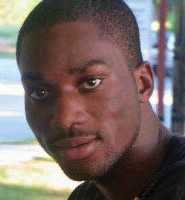"Disability Is Humanity."

We as disabled people have to show society we can succeed because of our own ingenuity.
Reflecting on the 30th Anniversary of the Americans with Disabilities Act and Black History Month, Derrick Tuff thinks the great success of America is our foundation on the idea of common humanity in our diversity.
Tuff, who is black, deaf, and a wheelchair user, said he believes when we truly see the humanity in another person, whatever their race or disability, we will choose to empower and encourage each other. And to Tuff, disability is humanity.
“Anyone can become disabled,” he said. “I like to think of disability as an acronym for distinct ability. We all have unique abilities as well as limitations, and when society realizes that, accommodating and including a disabled person won’t be an inconvenience but rather a universal commonality.”
But the challenge comes in getting society to the humanity of intersectional groups of people, like disabled people of color.
“That is where we have a lot of work to do,” Tuff said. “Disabled people have protections under the law, but culturally the way we think about disabled people needs improvement.”
For the most part, Black History Month has left disability out from the stories of those who were black and disabled – which says a great deal about how we view disability – either needing to be erased because it is seen as negative or just plain ignored because it isn’t important. A good example is the recent Harriet Tubman movie ‘Harriet’, which left out the fact she suffered a traumatic brain injury during her time as a slave, leaving her with a lasting disability that impacted her and her work.
A recent Rewire.News article, The Overlooked History of Black Disabled People, by black disability rights activist Vilissa Thompson, discusses why including the disabilities of black icons from history in our teaching and storytelling is critical: it means that multiply marginalized people will be acknowledged and their struggles realized so the future can be truly inclusive.
The way to do that? Tuff thinks disabled people must be able to advocate for themselves because they know themselves best and because frankly, opportunities will never be extended from an able-bodied world. In other words, if the place for equality isn’t given, disabled people should create their own and take it. The future of disability rights rests on this idea.
“We as disabled people have to show society we can succeed because of our own ingenuity,” Tuff said. “There are still so many misconceptions about disabled people in society, which means we won’t be given a chance, even though we know we can meaningfully contribute.”
The Atlanta native moved to Utah for work. After being a volunteer coordinator for the Americorps Vista program, Tuff saw what he was capable of doing, like being personable, among other professional attributes. Currently, he is a business relations intern with Utah State Office of Rehabilitation, working with businesses to teach them about the many skills disabled people have to offer in the workforce.
“I love it!” Tuff said, “I’m passionate about independence for disabled people.”
Independence is hard to achieve as a disabled person, however, because of employment discrimination and economic hardships. This is why Tuff hopes to create needed job opportunities for disabled people by starting a diverse range of retail stores to employ disabled people.
“I want to create something that gives job opportunities to disabled people, and even teach them how to be entrepreneurs,” Tuff said. “Changing the mindset of society on disability will take an eternity. True equality will never exist unless we have the opportunity to show society.”
Self-advocacy is the key to creating those opportunities, Tuff said.
“We’ve gone from the idea of the initial disability rights movement of ‘What can abled-bodied people do for disabled people?’ to the current movement of, ‘What can disabled people do for themselves?’” Tuff said.
“Disabled people have the right to speak for themselves and know what rights they are entitled to – not only a legal right, but a human right,” Tuff said.
As for race equality, Tuff said people need to remember may be culturally different, but we are universally the same.
“There’s no biological difference between white and black people,” said Tuff. “And we may have physical differences due to disability, but we can acknowledge and embrace those differences.”
Learn more about black history and disability by searching #BlackDisabilityHistory on Twitter, and current day efforts by searching #DisabilityTooWhite.

